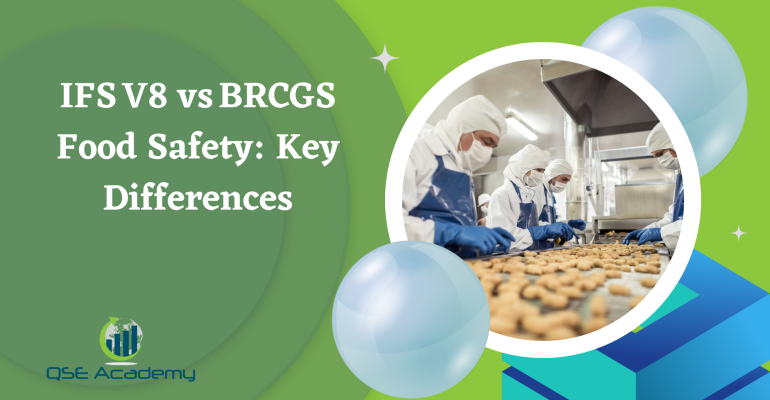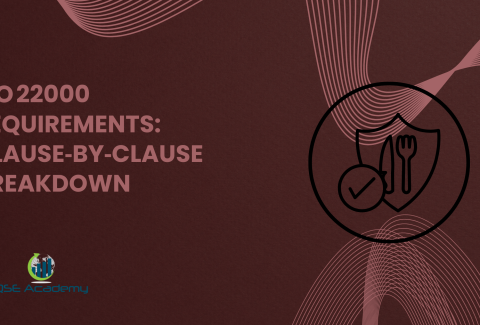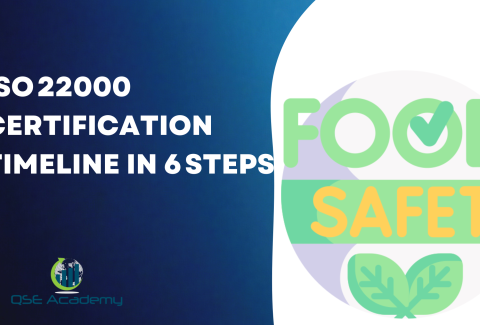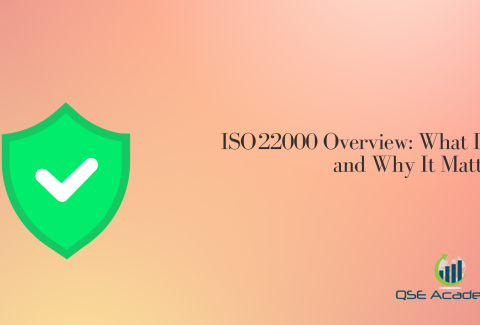IFS V8 vs BRCGS Food Safety: Key Differences
Last Updated on December 23, 2025 by Hafsa J.
Why This Comparison Matters (IFS vs BRCGS)
If you’re trying to decide between IFS Food V8 and BRCGS Food Safety, you’re not alone. I’ve worked with food manufacturers across Europe, the UK, the Middle East, and Asia, and one pattern keeps repeating: companies rarely compare these two standards because they want to—they compare them because a retailer, brand owner, or regulator pushes the conversation.
The real challenge isn’t just understanding the clauses. It’s deciding which one aligns with your business model, operational maturity, and customer expectations.
By the end of this guide, you’ll have a clear understanding of:
- How both standards are structured and applied
- The auditing and scoring differences that impact certification outcomes
- Documentation and implementation expectations
- Which standard fits your business type and market
This isn’t theory—it’s based on real audits, implementation journeys, and conversations with certification bodies.
Standard Scope & Applicability — Which Standard Fits Your Business? (IFS Scope vs BRCGS Scope)
Here’s what I’ve noticed: companies often assume both standards are interchangeable because they’re GFSI-recognized. Technically, that’s true. But in practice, the choice can influence customer perception, market access, and ongoing compliance workload.
How They Differ in Use:
- BRCGS is widely recognized in the UK, North America, and by global retailers.
- IFS Food V8 is dominant in Europe—especially France, Germany, Italy, and Spain.
Quick rule of thumb:
If you’re supplying UK retail chains, BRCGS is almost always expected.
If you’re working with EU private-label brands, IFS is typically preferred.
A real example:
A client in Italy manufacturing ready-to-eat dips got certified to IFS Food. Most of their business was in EU retail. Once they expanded to UK retailers, they had to add BRCGS because buyers wouldn’t accept IFS alone.
Common mistake:
Choosing a standard based on assumptions instead of verified buyer expectations.
Better approach:
Ask your top 5 existing or target customers:
“Which certification standard do you require or prefer—IFS, BRCGS, or either?”
 Audit Models & Scoring — What Makes the Biggest Difference (IFS Scoring vs BRCGS Grading)
Audit Models & Scoring — What Makes the Biggest Difference (IFS Scoring vs BRCGS Grading)
This is where things get interesting.
IFS Scoring System
IFS uses A, B, C, D scoring plus KO (Knock-Out) requirements. A KO failure = automatic failure.
It’s a system that rewards precision and operational consistency.
BRCGS Grading System
BRCGS assigns grades such as AA+, AA, A, B, C, and D.
There’s more tolerance for minor non-conformities, but unannounced audits become mandatory after certain cycles.
Why this matters:
IFS pushes operational discipline.
BRCGS pushes documentation, defined processes, and structured governance.
Pro Tip:
Companies with strong shop-floor execution often perform better under IFS.
Companies with strong documented systems and process governance tend to align well with BRCGS.
Documentation & System Expectations — What You Must Control (IFS Documentation vs BRCGS Requirements)
Both standards require solid documentation, traceability, allergen management, food defense, supply chain controls, and risk-based planning.
But the level of prescription differs.
- BRCGS tells you exactly what to do.
- IFS gives you the flexibility—but expects excellent execution.
Practical example:
A poultry processor I worked with had beautiful HACCP documentation but inconsistent operational execution. They achieved BRCGS Grade A after strengthening governance—but struggled with IFS until their production floor discipline improved.
Common pitfall:
Over-documentation without operational alignment.
If you can’t apply it consistently, auditors will notice within minutes.
Pro tip:
Build the process first. Document second. Audit third.
Food Safety Culture, Risk Assessment & Continuous Improvement (IFS Culture vs BRCGS Culture Requirements)
Both standards require food safety culture initiatives. But how they expect you to demonstrate maturity differs.
- BRCGS expects measurable actions—KPIs, surveys, performance metrics, and evidence of continuous improvement.
- IFS focuses more on operational behavior, leadership involvement, and communication.
Important mindset shift:
Food safety culture isn’t training. It’s behavior change.
If you’re unsure whether culture is embedded, ask:
- Do employees stop production when they see a nonconformity?
- Do supervisors escalate issues or hide them?
- Are decisions made based on risk or convenience?
If the answer to those questions feels uncomfortable, there’s work to do.
Implementation Complexity & Cost — What It Really Takes (IFS Certification Cost vs BRCGS Cost)
Both certifications require investment. The cost varies depending on:
- The certification body
- Audit duration
- Complexity of your product and processes
- Workforce size
- Number of production lines or locations
What I’ve seen in practice:
- BRCGS may require more time upfront because of prescriptive documentation rules.
- IFS may require tighter operational controls, especially for KO points.
Neither is cheaper in the long run—they just shift where the effort goes.
Pro tip:
Before choosing, run a gap analysis against both standards. It’s the fastest way to understand effort, timelines, and investment.
Which One Should You Choose? Decision Framework (IFS vs BRCGS Decision Guide)
If you’re still uncertain, use this simple filter:
| Scenario | Best Match |
|---|---|
| Supplying UK retailers | BRCGS |
| Supplying EU private label or discount retail | IFS |
| Strong governance and documented structure | BRCGS |
| Strong operational execution and real-time controls | IFS |
| Long-term global market expansion | Either (or both) |
And yes—some companies hold both.
Exporters especially.
FAQs — Common Questions About IFS & BRCGS
Can we transition from one standard to the other easily?
Yes, but expect adjustments in scoring methodology, documentation, and audit evidence expectations.
Is one easier than the other?
Neither. They just require different kinds of maturity. BRCGS is clearer; IFS expects consistency.
Do both require unannounced audits?
Yes—although implementation timelines differ.
Conclusion — Clarity and Next Steps
Both IFS Food V8 and BRCGS Food Safety offer strong, credible pathways to certification. The right choice depends on your market, maturity level, documentation culture, and customer expectations.
If you want help deciding—or you’re ready for a gap assessment or implementation plan—I can guide you through the next steps based on your business model and certification goals.
Whether it’s ISO 9001, ISO 22000, or the cosmetics-focused ISO 22716, I’ve spent my career I’m not here to call myself an expert—I prefer “enthusiast” because I truly love what I do. When I’m not writing about standards, you’ll probably find me playing Piano 🎹, connecting with people, or diving into my next big project💫. I’m an engineer specialized in the food and agricultural industry
make ISO standards less intimidating and more approachable for everyone.
turning complex jargon into clear, actionable steps that businesses can actually use.
There’s something incredibly rewarding about helping people navigate food safety and quality management systems
in a way that feels simple, practical, and even enjoyable.
I have a Master’s in QHSE management and over 12 years of experience as a Quality Manager
I’ve helped more than 15 companies implement ISO 9001, ISO 22000, ISO 22716, GMP, and other standards
My clients include food producers, cosmetics manufacturers, laboratories, and service companies
I believe quality systems should be simple, useful, and efficient.










